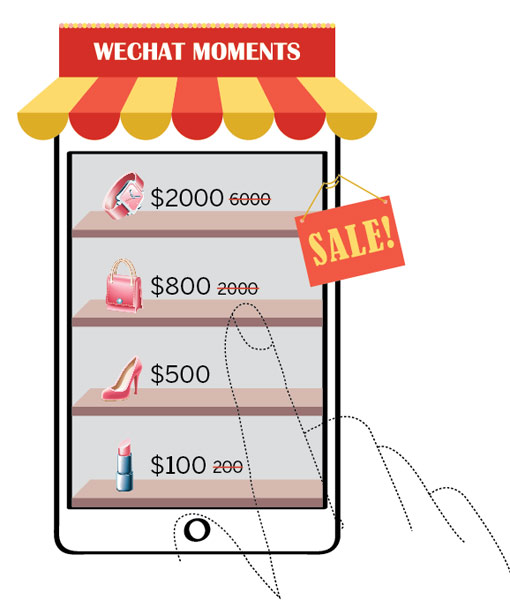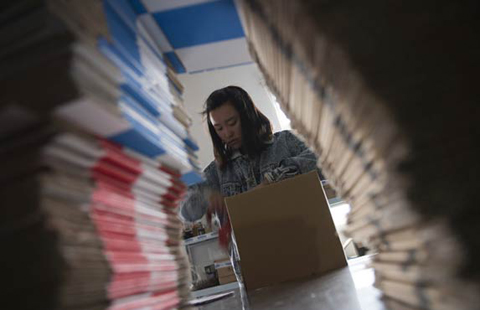Online agents cash in on WeChat Moments
Updated: 2015-02-26 04:55
By LI XUEQING in Shanghai(China Daily Canada)
|
||||||||
 |
|
Lu Ping/China Daily |
Many Chinese WeChat users are finding that their Moments, a popular function of the mobile social-network app WeChat, has turned turn into a shopping platform in recent months.
From milk power, fish oil capsules to affordable luxury items such as Michael Kors and Coach bags, one can buy them easily through their WeChat friends who have become online agents for overseas purchases.
Quanquan (not her real name) is a part-time online agent in Toronto for overseas purchase. She goes to Wal-Mart or Cisco once or twice a month to buy milk powder and other baby products and ships them to her customers in China who are young Chinese mothers in search of safe milk powders and vitamin pills for their babies. Quanquan's customers get to know her business through WeChat Moments, which allows its users to share pictures and texts with friends.
According to a recent survey by China Youth Daily's social-survey center, 67.7 percent of 2,356 subjects follow updates on WeChat Moments frequently. The total number of active user accounts reached 834 million at the end of the second quarter of 2014, according to Tencent, the owner of WeChat. It has become an alluring platform for business promotion and has created a huge army of overseas purchasing agents, many of whom are Chinese students or immigrants. They take orders online, make profits by charging commissions.
Every day Xinxin (not her real name), Quanquan's elder cousin who lives in Zhejiang province, posts on Moments pictures and introductions of products Quanquan has sent from Canada. Xinxin's WeChat contacts view the posts and make further inquiries about the products on WeChat. Xinxin take orders on WeChat and sends the shopping lists to Quanquan, who will get the purchase done in Canada and mail the goods back to China.
Quanquan charges 10 percent to 15 percent commission for each deal. Her monthly profits from overseas purchasing fluctuates between C$300 ($238) and C$1,000, which she splits 50-50 with Xinxin. For Quanquan, a 24-year-old marketing professional, it's only pocket money.
Li Jia (not her real name) also takes uses the business as a way of making petty money. She can't tell how much money she has made since she started the overseas purchase business in Canada in October, because she said that she never adds it up. The housewife posts pictures of various goods such as Coach wallets and Canadian ginsengs on her Moments, but only when she's free from taking care of her baby.
Compared with opening online shops, WeChat Moments shopping is better because one doesn't have to look for customers because WeChat contacts will read it several times a day. Also, Chinese people believe people they know would not cheat them, while unknown business people are more likely to be profiteering merchants.
Quanquan has a Taobao store selling the same products, but most of her customers are from WeChat. Young mothers are particularly meticulous about baby food and products. They want to buy such things from someone they know and can trust, not some unacquainted Taobao store owners. And they bring in more WeChat contacts.
A number of part-time online agents of overseas purchases rely on their WeChat contacts to do the business. Wei Hong (not her real name) is a postdoctoral researcher in Seattle. She has been an online agent of overseas purchases for half a year to make some pocket money after her baby was born last year. Products made or sold in the United States have always been popular with some of her friends since she went there to study in 2007. They encouraged her to start the business and they are willing to pay the commissions.
Right now WeChat Moments is her only channel to promote her business. She updates the posts three or four times a day. And Wei, a busy researcher and a young mother, has no intention of expanding her business beyond her circle of friends.
However, selling goods on WeChat Moments has caused resentment. It was originally a platform for friends to interact with each other, but now it has been invaded by advertisements that flood the screen.
The China Youth Daily survey shows that 63.3 percent of the subjects don't like advertisements on WeChat Moments, while 53.7 percent will block friends who post such information.
"Not all business models can survive on WeChat Moments," says Liu Run, president of Shanghai Run2me Management Consulting Co Ltd and a researcher on Internet economy. He points out that individual user's sales promotion on WeChat Moments can be harassment to other users because it lacks the necessary data and techniques to target the right customers.
"If you happen to be in want of the products being promoted, then it's fine. However, nine out of ten promotional posts you see may not appeal to you at all. Then they are harassment. One usually has limited number of WeChat contacts, say a few hundred at most. It's hard to find something you want to buy on the Moments of these people."
Quanquan also has noticed people's aversion to sales on Moments. She seldom promotes products on her own Moments, leaving the task to Xinxin. "Most of my WeChat friends are in Canada, they don't need to buy things from me. On the contrary, there is the right group of customers among Xinxin's friends."
She said competition is getting fiercer in this business and the profit margin less. The growing number of Chinese students and immigrants abroad may be partly contributing to this situation. Take Canada for example, Chinese students studying in Canada reached nearly 30,000 in the first three quarters of 2014, forming the largest foreign-student group in the country, according to Chinanews.com. Canada also granted permanent residence to more than 34,000 Chinese in 2013.
"It seems that everyone I know in Canada is somewhat involved in or was in the business," says Quanquan. Some fail after trying for two or three months, and some survive.
They are facing stricter regulations, too. The new regulation from the General Administration of Customs of China, which came into effect on August 1, stipulates that all enterprises and individuals engaged in cross-border e-commerce have to provide a list of imported and exported items to the customs authorities.
The Chinese customs authorities conduct a selective examination of the post packages from foreign countries. Quanquan declared all the goods at the customs before mailing them to her customers, the tariff is prepaid by her customers. She knows that many other agents don't do. Declaring all goods will certainly further reduce their profits. Some agents make agreements with their customers beforehand that if the packages are examined out of "back luck", the customers will pay the tariff. An anonymous agent tells the reporter that the new regulation makes it harder for her to make money.
She said that attracting and keeping customers is essential. Her customers are mainly brought by Xinxin, who is also the reason Quanquan started the overseas-purchasing business at the end of 2013. After Xinxin got pregnant, she asked Quanquan to buy milk powder for herself and her new born baby from Canada. Then they found there was a large demand for milk powder and baby products among Xinxin's friends.
Liu thinks it's fine for people to make pocket money by selling goods they buy overseas which they think are worth being recommended, but there is no future for serious entrepreneurs to sell goods on it.
"Actually a lot of sellers on Moments don't even really know the things they are selling. They get the goods from other agents whose levels are higher in the sales chain. They make little money and many of them have met quality problems of the goods they sell. You may make some money at first, but you are actually selling your social network at a cheap price. It's like quenching thirst with poison," comments Liu.
"Moreover, WeChat highly values users' experience. Once its users feel bad about its over-commercialization, they will leave it. So the management team of WeChat will step in."
Tempting users to share the posts of official accounts by offering rewards is banned. On Feb 15, WeChat announced it would block official accounts involved in illegal distribution.
As to individual sellers like Quanquan and Li, Liu suggests that they sell their products in WeChat groups. Putting target customers in a group and doing promotion only in this group may be a way to stay longer in business on WeChat.

 Across America over the week (from Feb 20 to 26)
Across America over the week (from Feb 20 to 26)
 Phoenix landing
Phoenix landing
 Inside a Taobao village
Inside a Taobao village
 Testing mettle: Students appear for art college exam
Testing mettle: Students appear for art college exam
 Top 10 best-selling SUVs in Chinese mainland in 2014
Top 10 best-selling SUVs in Chinese mainland in 2014
 The eighth nine days: wild geese are flying back
The eighth nine days: wild geese are flying back
 China's biggest Akhal-Teke horse base
China's biggest Akhal-Teke horse base
 Chengdu citizens visit Du Fu Thatched Cottage to mark Human Day
Chengdu citizens visit Du Fu Thatched Cottage to mark Human Day
Most Viewed
Editor's Picks

|

|

|

|

|

|
Today's Top News
Tech firms cut from approval list
Yuan on move, but not to top
'Star Trek' legend Leonard Nimoy dies at 83
EB-5 could harbor fraud: report
US Representative requests Lunar New Year honors
Shanghai tops China's disposable income list
Hainan expands US non-stops
Google upbeat about reentering China: Forbes
US Weekly

|

|







